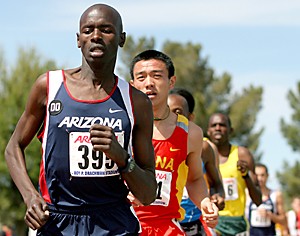He’s fast. Really fast. And he’s got endurance.
So much that in this year’s cross country season, he’s already claimed his second consecutive Pacific 10 Conference title and become the ninth athlete in Pac-10 history to win the race in consecutive seasons.
Senior distance runner Robert Cheseret is any track and field team’s dream athlete, but will he be able to make it to the next level?
The Olympics that is.
Cheseret, who started running for Kurgung Boys High School in his native Kenya because all of his siblings were runners, moved to Arizona because of his older brother.
“”My older brother trained here and I liked it,”” Cheseret said.
His decision to start running has earned him much success ever since.
A four-time outdoor, three-time indoor and two-time cross country All-American, Cheseret placed second in the 3,000-meters at the NCAA Indoor Championships March 11 with a time of 8:04.15.
Cheseret also now holds Arizona records in the indoor 3,000m, indoor 5,000m and outdoor 5,000m and has the third-fastest 5,000m mark all-time in the Pac-10.
But what does Cheseret think it will take to get to the next level?
“”I just need to do more training,”” Cheseret said. “”Just do what I’ve been doing and just stay focused.””
He definitely has the ability to be able to become an Olympian, said Fred Harvey, Arizona’s track and field head coach.
“”His dreams and aspirations are definitely in that direction,”” Harvey said.
But he said it’s not going to be a piece of cake.
“”Just like any athlete, you have to perform well at the Olympic trials, and you have to make your team,”” Harvey said.
Cheseret, who plans on going to the Olympic Trials for the 2008 Summer Olympics in Beijing, said he has no doubt that he’ll be accepted.
“”I think the way I am training right now, I am going to have a good chance of making it,”” Cheseret said.
He knows there’s always room for improvement.
“”There are more things I need to improve on,”” Cheseret said. “”But in the next three years I should be able to get better.””
Arizona cross country head coach James Li said he thinks it’s possible that Cheseret will make it to the Olympics.
Cheseret, who according to Li already trains about two hours a day, will have to increase his practice time to make it.
“”He’s definitely going to need to increase the training at a higher level,”” Li said.
So what is a typical week like for Cheseret?
“”I train six days a week,”” he said. “”Some days we’ll do speed walks. Some days I’ll run 15 miles, the next day I’ll run 10.””
With all of this training, Cheseret said he often misses out on having a social life.
“”Sometimes you want to hang out with friends, but you have to make sacrifices,”” he said.
If he were to make it to the Olympics, Harvey said his training would not differ much from the things he is doing now.
“”(But) the intensity level is going to be the biggest focal point,”” Harvey said.
To make matters more difficult, Harvey said Cheseret will be competing to represent a country known for its long-distance runners.
“”He has to be one of the top three Kenyans in any respective event to make it,”” Harvey said.
Cheseret said he believes the most important aspect he needs to work on is his experience, which can only come through time and more training.
“”I need to run against more professionals,”” he said. “”I’ve been competing against colleges, but I need to compete against professional athletes. I need to get used to that.””
Even with these improvements, Harvey said he likens Cheseret’s difficult road to the analogy of a basketball team.
“”The best basketball team doesn’t always win the national title,”” Harvey said. “”Again, he has the ability to do so, whether or not he accomplishes it is another thing.
Don’t tell that to Cheseret because he’s never going to give up.
“”It’s not going to be easy,”” he said. “”I’m going to be running for the rest of my life.””









